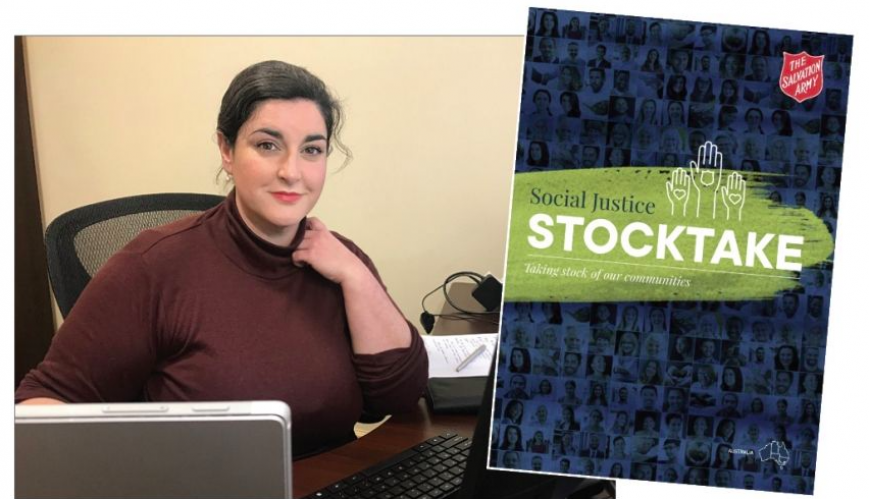A day in the life of...Jennifer Kirkaldy

A day in the life of...Jennifer Kirkaldy
20 February 2022
Jennifer Kirkaldy, Salvation Army General Manager Policy and Advocacy, and her team advocate for those experiencing hardship and injustice in our community.
Jennifer Kirkaldy, General Manager Policy and Advocacy, gives us an insight into what her job entails. Jennifer and her team produced the Social Justice Stocktake report.
Can you give us an overview of your job?
- I lead and look after the Policy and Advocacy team. We have three broad functions: Social justice education and empowerment – providing the tools and information to empower Salvos and the community to work for justice.
- Social Policy development – using the data and insights of The Salvation Army to identify social injustice and then finding solutions that will address the structural and societal drivers of that injustice.
- Advocacy – engaging with decision-makers to implement the solutions we have found. It is all about changing how things are done.
What’s the first thing you do when you arrive at work (even if that’s at home!)?
Before I sit down at my desk, I check that no urgent emails have come in overnight. If something urgent has come in, that is how I will start my day. Otherwise, I spend a little while checking the news – this is a good way to see if any new announcements have been made or reports released.
What can a typical day involve for you?
Every day is different – but they almost all involve lots of meetings! On any given day, I might meet with a member of parliament or other decision-makers, which is an opportunity to further The Salvation Army’s advocacy goals.
If we have a big submission due (in response to the government inquiring into a matter the Salvos focus on), then I’ll spend time meeting with the subject matter experts around the Salvos, workshopping with the team to develop our main arguments, or actually writing the submission.
Sometimes we are called to give evidence to a parliamentary committee, and on those days, I spend a lot of time preparing for that. Some days we have more time to be strategic and plan who we need to engage with and what arguments will be most convincing to achieve our advocacy goals.
What’s the most challenging part of your work?
Often it feels like we just aren’t making progress. We might spend hundreds of hours researching, writing thousands of words on an issue, having countless meetings, and then ... nothing.
Of course, that is not actually the case; it is just that changing social policy is a slow process. Even when it feels like no one is listening, the wheels are turning in the background. We just need to keep at it, but sometimes it can be disheartening in the middle of the process.
What’s the most rewarding?
When you get it right, you really can make a huge difference. For example, in the family violence space, we traced a comment made by a frontline worker to an extensive argument we made in our submission. That then became a recommendation the Parliamentary Committee made to the Minister, which turned into a fully funded line item in the budget. Now a program is getting much-needed funds into the hands of people escaping family violence.
That was many hours of work that for a long time felt like it was going nowhere, but now 9000 victim-survivors are better off in part because of The Salvation Army’s advocacy. That makes it worthwhile.
How has COVID-19 affected your work?
We have been very fortunate that COVID-19 has not affected us as much as many other teams, but we have certainly had to adapt! In some ways, it is easier to organise a meeting with an MP or senator when no one is travelling, but it takes more work to build rapport when you aren’t in the same room. As a team, we have not gathered for over two years now, and I’d be lying if I said I didn’t miss being able to pull out a whiteboard and brainstorm a problem.
What drives/motivates you to get up each day and go to work?
It sounds trite, but the knowledge that my work can make a difference. It is a great privilege to have a voice and be listened to when you speak. Not everyone enjoys that privilege. The Salvation Army has the opportunity and ability to amplify the voices of those who are experiencing hardship and injustice and have those voices heard by decision-makers. That is something really special.
The work our team was created to focus on is a natural and necessary part of the mission of the Salvos, which is about transforming Australia one life at a time [with the love of Jesus].